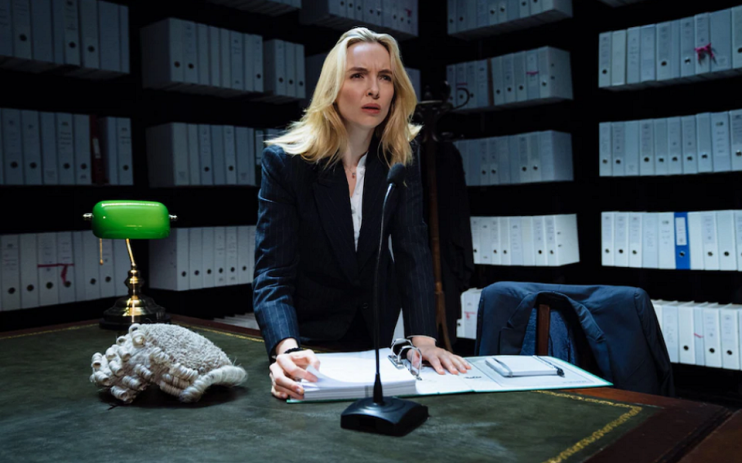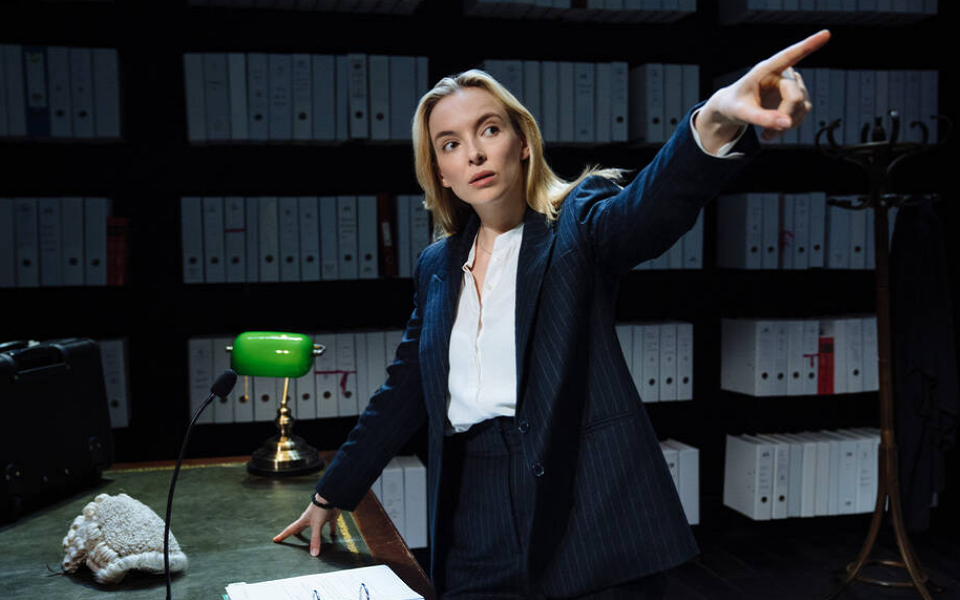Prima Facie review: from Villanelle to victim, Jodie Comer is a ferocious force on stage alone

Jodie Comer became one of the world’s most popular British acting exports as psychopathic predator Villanelle in Killing Eve, dispensing of victims with garden hoses, piano tuners, and dressed as a clown.
In her West End debut in Prima Facie, a new play by Suzie Miller, Comer has done what all self-respecting A-Listers do when they tread the boards – play a character as far-removed as possible from the one she’s most famous for. Comer is on stage alone as Tessa, a loveable, self-doubting working class woman from Liverpool who becomes a victim of sexual assault.
She’s also a barrister who defends men in sexual assault cases, believing in the legal system to, in many instances, get individuals across the line.
So, how is she? Comer is ferociously good, and let’s just get this straight: This is not just any knackering one-hour-forty-minute solo performance. This is a hugely emotionally hefty role for an actor more used to the safety net of shooting for television. It also requires a giant physical effort from Comer. Shifting tonally from light-hearted gags about university to enacting the torture of sexual assault, Comer prances about the stage with all the dexterity and nimble-footedness of a Villanelle kill.
She also never stops talking for more than a few seconds and on press night, doesn’t slip up once. Quite some doing for an actor with next to no theatre resume.

Miller’s message is that the legal system is completely broken – that it relies on archaic laws written by men about women which frankly aren’t empathetic to the practical realities of sexual assault. Women (and men too) that experience trauma aren’t going to remember every nuance of an attack, and therefore, the system needs changing to give victims more power, and more chance to win cases which are already hugely emotionally taxing to sit through. It’s a conversation playing out in real life: women’s groups and victims have long asked for law changes, as prosections for rape plummet and the majority of complainants never get to court.
Justin Martin’s direction and Natasha Chivers’ lighting design culminate this message with Comer breaking the fourth wall and speaking directly to the audience in a clever meta moment which is incredibly effective. Tessa delivers a speech to the court from her unique perspective as both a victim and barrister.
These sort of didactic State of the Nation summaries at the end of plays are typically on the ‘no no’ lists for theatre-makers, as they can feel preachy, but Miller has created a situation where it feels situationally fitting: As the house lights rise, mirroring the docks in an actual courtroom, Comer delivers her testimony like barbs.
But the weight and strength of dialogue creates genuine, sustained tension throughout. A thunderstorm recreated as effectively as any thunderstorm could be on stage offers the only moment of respite for Comer, who darts into the wings for under a minute to dry off. Miller’s gripping story is only occasionally challenged by Comer having a lot of logistical scene-setting to get through, without any help from co-stars. This occasionally takes away from Comer’s more pivotal role of acting out the actual trauma inherent within the text, but this is possibly more difficult for Comer than the audience.
When the lights dim and Comer gets to the uncomfortable sexual assault scenes, there’s no denying her reputation as one of the most versatile young actors coming out of Britain.
Prima Facie plays at the Harold Pinter Theatre until June 18
